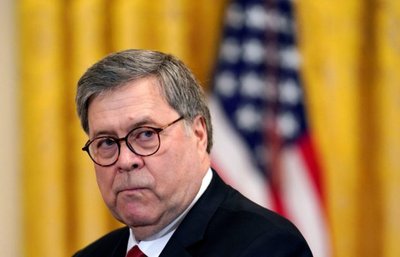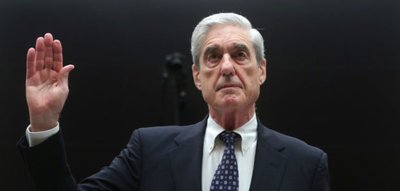Update! (May 30, 2019) :
Take a look at the three videos below (watch video #1 above, if short for time) and answer the questions below to find out the latest on Special Counsel Robert Mueller’s investigation into Russia’s interference in the 2016 presidential election. Mueller made his first public appearance on Wednesday since his appointment two years ago.- Essential question : What main points did Robert Mueller make in his public statement?
- How do you interpret his points? Why does Mueller not come out directly to say what should be done as a result of the report?
- Do you think Mueller’s statement makes it clear as to whether or not Trump obstructed justice? Why is it unconstitutional for the Department of Justice to indict a sitting president? According to Mueller, whose job in the government is to act if the president commits a crime? (answer: Congress)
- How do you think Mueller’s statement will affect public opinion about the Trump administration? How about the 2020 presidential election?
- How does Mueller’s statement on Wednesday differ from Attorney General William Barr’s reaction to the Mueller’s report? (see below to learn more about Barr’s four-page summary of the Mueller report)
1. Mueller breaks silence to say report doesn’t clear Trump
In a nine-minute statement , he reiterated that Justice Department policy prohibits charging a sitting president with a crime, and that his report did not clear President Trump of committing a crime.2. The ‘key points’ Robert Mueller made in his public appearance
Special counsel Robert Mueller made it clear in his statement on Wednesday that he wants his team’s lengthy report to speak for itself. NPR’s Carrie Johnson and former Justice Department official John Carlin join NewsHour to revisit key sections of the report and discuss Mueller’s approach to his first public appearance since his appointment two years ago.3. Will Mueller’s statement change public sentiment about impeachment?
Judy Woodruff talks to Chris Buskirk of American Greatness and Kent State University’s Connie Schultz about Robert Mueller’s first public statement in two years and whether it will increase momentum for impeachment, policy plans among 2020 Democratic presidential candidates and the top issues on voters’ minds.
Discussion questions:
- Essential question : Why has the Mueller report further divided political leaders and the public?
- What do you know about the Mueller investigation? What prompted the investigation? What did the investigation have to do with Russian meddling in the 2016 election?
- Why was Special Counsel Robert Mueller’s full report not released? Do you think the full report should be released to the public? Explain your response.
- According to Barr’s synopsis, the Mueller report stated that Russia interfered with the 2016 presidential election by attacking Trump’s opponents on social media and stealing emails from Hillary Clinton’s campaign and the Democratic National Committee, however, the Trump campaign did not coordinate these actions. Why is this distinction be important?
- When you heard stories about the Mueller investigation, what were the headlines? How is the news media currently covering the news of the Mueller report?
- Barr’s office has not stated if he will release a copy of the full Mueller report. What are the challenges in covering this subject for the news media and understanding it as a voter and citizen without the full report?
Extension Activities:
Dig deeper : Have students dig deeper into the U.S. democratic system as it relates to the Mueller investigation, Russia’s interference in the 2016 election and President Trump’s financial ties to Russia.- The nearly two-year investigation of special counsel Robert Mueller into Russian interference in the 2016 presidential election concluded with Mueller’s final report delivered to Attorney General William Barr for review. PBS NewsHour and FRONTLINE illuminates the complex details behind the Mueller investigation and analyzes what’s yet to come. You may wish to watch parts of the documentary below in class or assign parts of it to your students for homework.
- Republicans say the attorney general’s four-page summary of the Mueller report exonerates President Trump on obstruction of justice. Democrats counter that William Barr’s analysis is not sufficient to answer that question. Judy Woodruff talks to Neal Katyal, former acting solicitor general under President Obama, and Paul McNulty, former deputy attorney general under the first President Bush. See the transcript here .
- In November, PBS NewsHour’s Lisa Desjardins spoke with David Sanger, national security correspondent for the New York Times, and Matea Gold, enterprise and investigations editor for the Washington Post, about potential conflicts between Trump’s business and policy interests. Why do you think Trump’s financial interests with Russia were not a focus of the Mueller report? (remember: the Mueller report focused on collusion between the Trump campaign and Russia during the 2016 presidential election.) See the transcript here.
- There is no doubt that Russia’s government attempted to influence the 2016 U.S. presidential election. As William Brangham reports, once the U.S. intelligence community reached that consensus, as well as high confidence that Russian President Vladimir Putin personally ordered the cyber and social media “disinformation” campaigns, a major investigation and dozens of indictments followed. See the transcript here .
Sign up for short education highlights from the PBS NewsHour here . Fill out this form to share your thoughts on Classroom’s resources. Sign up for NewsHour Classroom’s ready-to-go Daily News Lessons delivered to your inbox each morning.



